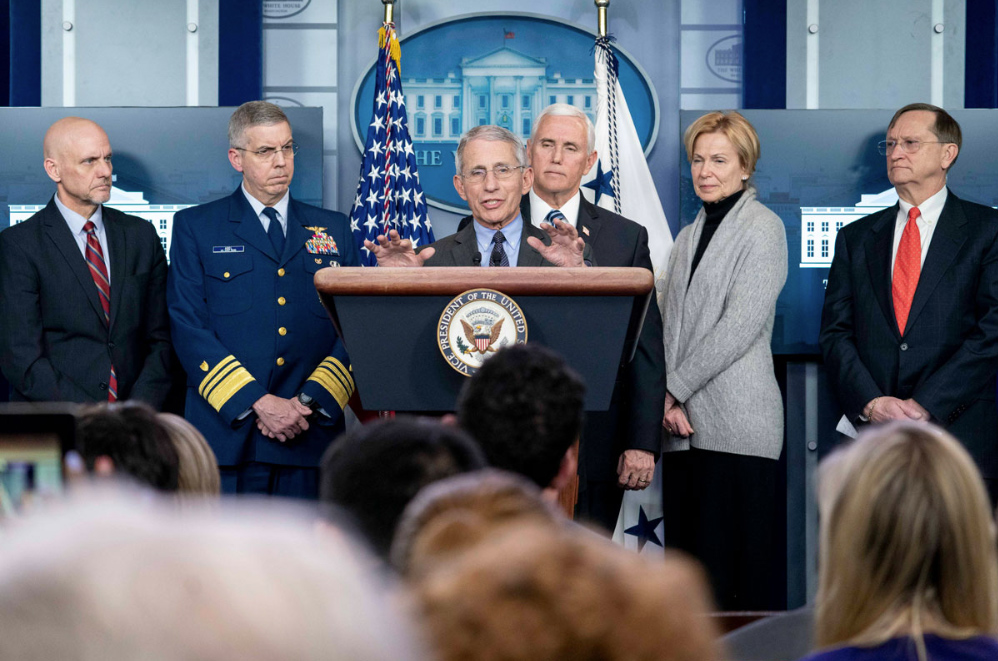 A briefing by the Coronavirus Task Force (coronavirus.gov)
A briefing by the Coronavirus Task Force (coronavirus.gov)
The Need for American Leadership During COVID-19
The White House’s recent statement that “…the world is looking at us as a leader in COVID-19” warrants a look at U.S. leadership today and the message it is sending overseas. Far from being a leader in the response to COVID-19, the U.S. is near the bottom of effective national responses to the threat. The failure to control the spread of COVID-19 does not send the message that the U.S. is competent in dealing with a public health crisis. Internationally, the U.S. has been largely absent.
With the severity of the virus affecting the entirety of the world, the U.S. has lost a major opportunity to develop a worldwide strategy for dealing with a global threat. Rather than coordinating an international response combining science and policy, the U.S., like many other countries, has adopted an “every man for himself” attitude—epitomizing the absence of leadership. Rather than leading, the U.S. has decided to leave the World Health Organization during a time when U.S. leadership is most vital. It can do better.
Historically, the U.S, had led in facing global health crises. It played a major role in the eradication of smallpox, near elimination of polio, stopping Ebola, and fighting AIDS in Africa. Without an immediate plan for addressing the virus, the only the U.S. seems unwilling to lead against this pandemic short of successfully developing a cure or vaccine. Even then, in order to show leadership, it will need to lead a large-scale effort to distribute that treatment to the world. If another country develops a solution, the U.S. should volunteer to assist in implementing that solution on a large scale. In the run-up to this, the U.S. should be publicly promoting and organizing international collaboration between scientists and health professionals who are working to fight this virus.
Aside from data sharing and small-scale collaboration that is certainly happening between individual research organizations, there doesn’t appear to be a coordinated effort to do so on a large scale. In June, the UN Secretary General cited a “total lack of coordination among countries in the response to the COVID.” Yet the one country that is capable of leading, the United States, has not felt the need to do so.
This abdication of leadership has had consequences. Projections for the global economy have trended downward. Hundreds of thousands are dead. Rather than uniting behind or alongside an America seeking to lead, the countries of Europe have instead excluded the United States from a list of countries allowed to send non-essential travelers. So rather than proving itself exceptional, America is now the excluded.
Frankly, with the number of new cases still occurring in the U.S., it’s hard to see a path forward to demonstrate leadership. But it is possible if the country’s leadership gets genuinely serious.
To reestablish itself as a responsible world leader in the age of pandemic, the U.S. should:
- Get the outbreak under control at home by making the hard decisions necessary to rapidly reduce the number of new cases each week. This needs to be a nationwide effort.
- Coordinate a massive international collaboration to develop treatments/vaccines.
- Establish an international strategy for restarting the world’s economies and assisting those less able to weather the storm.
- Create an international system to detect travelers with COVID-19 and make appropriate decisions about quarantine, treatment, or repatriation.
- Form a PPE/equipment sharing/exchange system that allows countries to leverage their comparative advantages to better help each other out.
While COVID-19 is certainly not the only area in which the U.S. has taken a back seat, it is an area in which its leadership could truly make a difference in the world. Missing this opportunity is a strategic mistake and cedes the narrative to others.
Creating a new narrative around the U.S. reaction to COVID-19 has to go beyond blaming China. While investigating Chinese failures in containing the virus is worthwhile, the inability to control the spread within the United States demonstrates that China is not the only party responsible for the growth of the pandemic. Placing blame and leaving the WHO is not a strategy for increasing and America’s soft power or inspiring the world—but getting in front of the problem and leading the world to a resolution is.
If the United States wants to retain its position as a world leader—a country which others want to follow—it cannot forget the value of leading by example. So let’s set that example.





